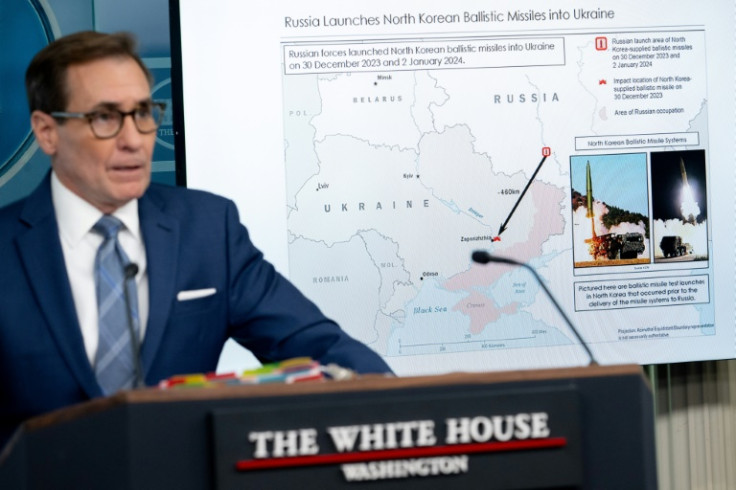Russia Used N. Korean Missiles For Ukraine Attacks: US

North Korea has provided Russia with ballistic missiles and missile launchers that were used in recent attacks on Ukraine in a major escalation of support for Moscow, the White House said Thursday.
Russia is also looking to obtain missiles from its ally Iran as it runs short of arms nearly two years into President Vladimir Putin's invasion of Ukraine, it said.
The White House's comments came as North Korean leader Kim Jong Un called for boosting production of missile launchers in preparation for a "military showdown" with South Korea and the United States, the official Korean Central News Agency said.
The Pyongyang-supplied missiles with ranges of around 900 kilometers (550 miles) were fired by Russia in two attacks on Ukraine within the past week, US National Security Council spokesman John Kirby said.
"Our information indicates that the Democratic People's Republic of Korea recently provided Russia with ballistic missile launchers and several ballistic missiles," Kirby told reporters in a briefing at the White House.
"This is a significant and concerning escalation of the DPRK's support for Russia."
The development underscored the need for the US Congress to pass a package of vital military aid for Ukraine, without which the pipeline of support will soon run dry, Kirby added.
Air defenses for Ukraine, which has come under a barrage of aerial attacks by Russia in recent days, were "absolutely" a priority, he said.
"It's critical that Congress meets this moment and responds by providing the Ukrainians what they need to defend themselves," Kirby said.
Russian forces launched at least one of the North Korean-supplied missiles on December 30, which landed in an open field in the Zaporizhzhia region, according to the spokesman.
Moscow's forces then fired "multiple" ballistic missiles into Ukraine as part of a mass aerial attack on January 2, he added.
Choi Gi-il, professor of military studies at Sangji University, told AFP that the Moscow-Pyongyang arms transfers could be Russia's way of "expressing its annoyance" over Seoul's own role in the war.
South Korea, which is a major arms exporter, "has been assisting Ukraine indirectly through an arms deal with NATO countries to make up for their arms supplies to Kyiv," he said.
Seoul has signed deals worth billions of dollars to send tanks and howitzers to Poland, a key ally of Ukraine.
"Russia's invasion of Ukraine triggered this arms race between the two Koreas," Choi added.
The United States and its allies will raise the fresh arms transfers at the United Nations Security Council, as it represents a breach of UN sanctions against North Korea, said Kirby.
Britain said it "strongly condemns" Russia's use of North Korean missiles.
"Russia is turning to North Korea for its weapons in pursuit of its cynical and ill-conceived military aims in Ukraine. This is symptomatic of its isolation on the world stage and a sign of its desperation," a Foreign Office statement said.
North Korea would pay a "high price" for breaching UN sanctions, it added.
Russia also intends to purchase missiles from its ally Iran and talks are under way on the purchase of close-range ballistic missiles although no agreement has yet been reached, Kirby added.
The United States said in October that North Korea had delivered more than 1,000 containers of military equipment and munitions to Russia, but it was the first time it had reported the use of such weapons.
Kim Jong Un traveled to Russia's far east in September and met Putin, sparking concern among Kyiv's allies over the possibility of a potential arms deal.
Putin, who launched his invasion in February 2022, promised to intensify strikes on Ukraine after an unprecedented attack on the Russian city of Belgorod over the weekend.
Kyiv says the latest attacks underline the need for Western allies to speed up delivery of air defense equipment, combat drones and long-range missiles.
Ukrainian President Volodymyr Zelensky vowed in his New Year's address last week to wreak "wrath" against Russian forces in 2024, warning Kyiv had upped domestic production.
© Copyright AFP 2025. All rights reserved.





















